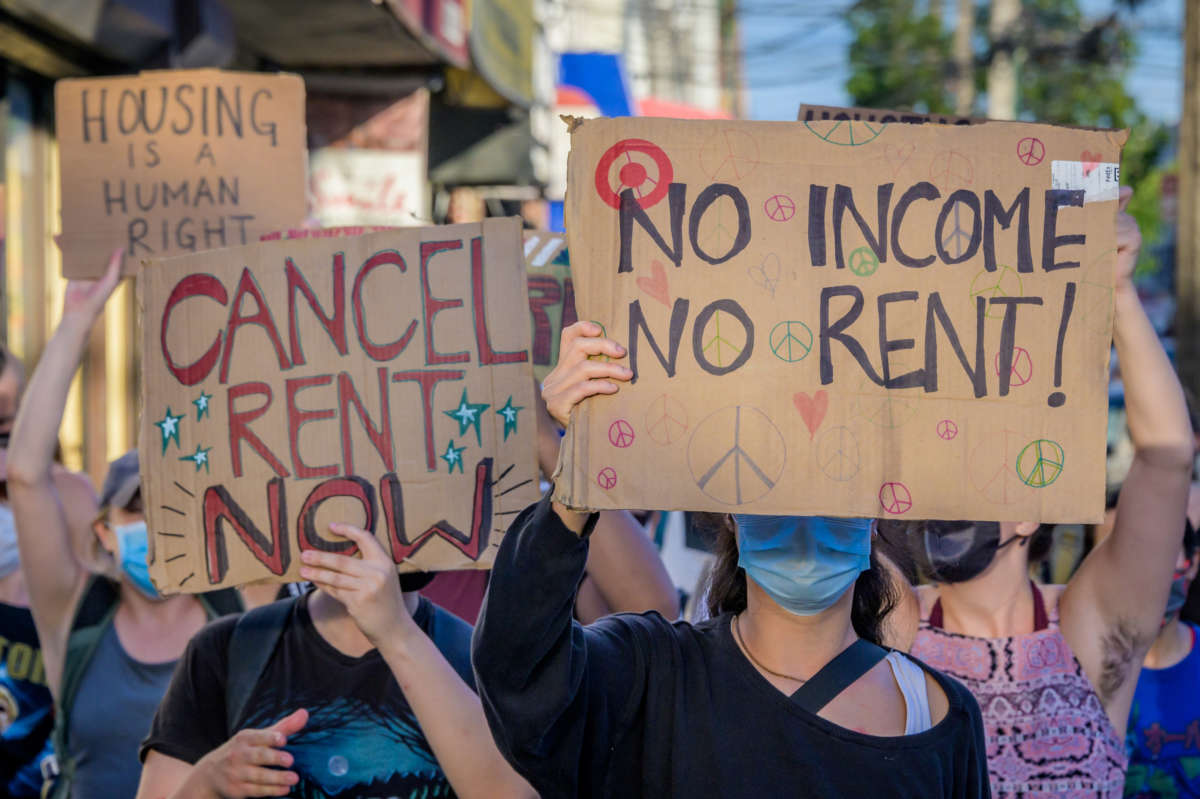Distribution of federal rental assistance funds has plateaued, prompting Sen. Elizabeth Warren (D-Massachusetts) and Rep. Cori Bush (D-Missouri) to send a letter to the Treasury Department seeking answers on why the disbursement has been so slow.
Last week, the Treasury Department released data showing that, as of the end of September, less than a quarter of federal rental aid had been disbursed and that previous progress on the rate of distribution had fallen off. In their letter to Treasury Secretary Janet Yellen, Warren and Bush expressed concern over the program’s rollout.
“Millions of households currently at risk for eviction desperately await the funds from the Consolidated Appropriations Act (ERA1) and the American Rescue Plan (ERA2) to remain housed as COVID-19 continues to cause staggering economic and health crises,” they wrote.
“Despite the high level of emergency financial need that has persisted as early as March 2020, these households continue to wait in vain while eviction proceedings loom threateningly,” the lawmakers continued. They then pointed out that Missouri has only distributed about 22 percent of its allocated funds to households in need, despite having the second-highest eviction filing rate during the pandemic.
Though they praised the Treasury Department for releasing new guidance last month to help local governments distribute their aid, Warren and Bush suggested that the department take further steps to clarify how the aid could be better distributed. They also asked the agency to release detailed statistics on the aid program, including the number of households that have applied but been rejected from receiving aid, and demographic data on applicants.
“Families across the country have faced eviction during this pandemic — only to have emergency rental assistance be slow-moving and often inaccessible,” Bush said, adding that she and Warren are seeking “answers … on how this program will be fixed.”
The letter was signed by over 50 members of Congress, including progressive lawmakers like Sen. Bernie Sanders (I-Vermont) and Representatives Pramila Jayapal (D-Washington), Alexandria Ocasio-Cortez (D-New York) and Jamaal Bowman (D-New York). The lawmakers gave Yellen until next week to respond.
Only about $10.7 billion of the $46.5 billion in rental aid authorized by Congress last December had been disbursed by the end of September, despite a September 30 deadline to have the aid distributed or else risk losing the funding. Ever since the eviction moratorium was shot down by the Supreme Court at the end of August, housing advocates and lawmakers have been urging local governments to speed up distribution.
According to data from Princeton’s Eviction Lab, evictions are spiking in some cities that don’t have an eviction moratorium, including Houston, Dallas and Kansas City, Missouri. In September, Warren and Bush introduced a bill that would allow the Department of Health and Human Services to implement federal eviction moratoriums in emergencies, but the bill faces long odds in the House and the deeply divided Senate.
Activists say that although aid is desperately needed, many local rental assistance programs are marred by red tape and bureaucracy, with applicants having to provide “proof” of their suffering and desperate need. Some governments set up inadequate systems of distribution that resulted in a significant portion of the money being used for other purposes; others tried to distribute money to landlords, only for the landlords to refuse the funds, which is illegal in some places.
Meanwhile, while landlords decried the eviction moratorium and real estate groups poured millions into ending the policy, new data reveals that landlords have fared relatively well since the moratorium was put into place. An analysis released this week by JPMorgan Chase found that although landlords did lose some money at the beginning of the pandemic, when millions of people were getting laid off or furloughed, they bounced back by May and June of 2020.
Join us in defending the truth before it’s too late
The future of independent journalism is uncertain, and the consequences of losing it are too grave to ignore. To ensure Truthout remains safe, strong, and free, we need to raise $46,000 in the next 7 days. Every dollar raised goes directly toward the costs of producing news you can trust.
Please give what you can — because by supporting us with a tax-deductible donation, you’re not just preserving a source of news, you’re helping to safeguard what’s left of our democracy.
